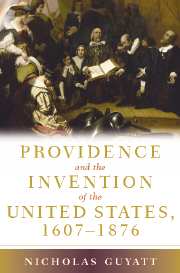Book contents
- Frontmatter
- Contents
- Acknowledgments
- Introduction
- PART ONE BRITAIN, AMERICA, AND THE EMERGENCE OF PROVIDENTIAL SEPARATISM
- 1 Providence and the Problem of England in Early America
- 2 “Empires are Mortal”: The Origins of Providential Separatism, 1756–1775
- 3 “Becoming a Nation at Once”: Providentialism and the American Revolution
- PART TWO PROVIDENCE, RACE, AND THE LIMITS OF REVOLUTION
- Index
2 - “Empires are Mortal”: The Origins of Providential Separatism, 1756–1775
Published online by Cambridge University Press: 12 December 2009
- Frontmatter
- Contents
- Acknowledgments
- Introduction
- PART ONE BRITAIN, AMERICA, AND THE EMERGENCE OF PROVIDENTIAL SEPARATISM
- 1 Providence and the Problem of England in Early America
- 2 “Empires are Mortal”: The Origins of Providential Separatism, 1756–1775
- 3 “Becoming a Nation at Once”: Providentialism and the American Revolution
- PART TWO PROVIDENCE, RACE, AND THE LIMITS OF REVOLUTION
- Index
Summary
On May 20, 1766, the students and faculty of the College of Philadelphia gathered for the annual commencement ceremony. Their ranks were swelled by a large number of the city's residents, attracted not by the usual academic exercises but by the results of a competition that had aroused interest locally and throughout the colonies. At the height of the Stamp Act crisis, a British member of Parliament, John Sargent, presented a gold medal to the college to be awarded for “the best essay on the reciprocal advantages of a perpetual union between Great-Britain and her colonies.” Sargent, a London merchant, had commercial as well as altruistic motives for promoting “perpetual union”; however, his competition coincided serendipitously with the resolution of the political crisis, giving a festive air to the proceedings. On the morning of May 19, Dorset ship captain Thomas Wise had been toasted in Philadelphia's coffeehouses for bringing the first confirmed report of the repeal of the Stamp Act. The city's residents quickly declared that May 20, commencement day, would also be marked by the illumination of the city, the firing of cannons, and the drinking of toasts to the king and to the union of Britain and its colonies.
On the afternoon of the 20th, a little before “many barrels of beer” were distributed among Philadelphia's populace, the gold medal was presented to John Morgan, a professor at the college and also a fellow of the Royal Society.
- Type
- Chapter
- Information
- Publisher: Cambridge University PressPrint publication year: 2007



